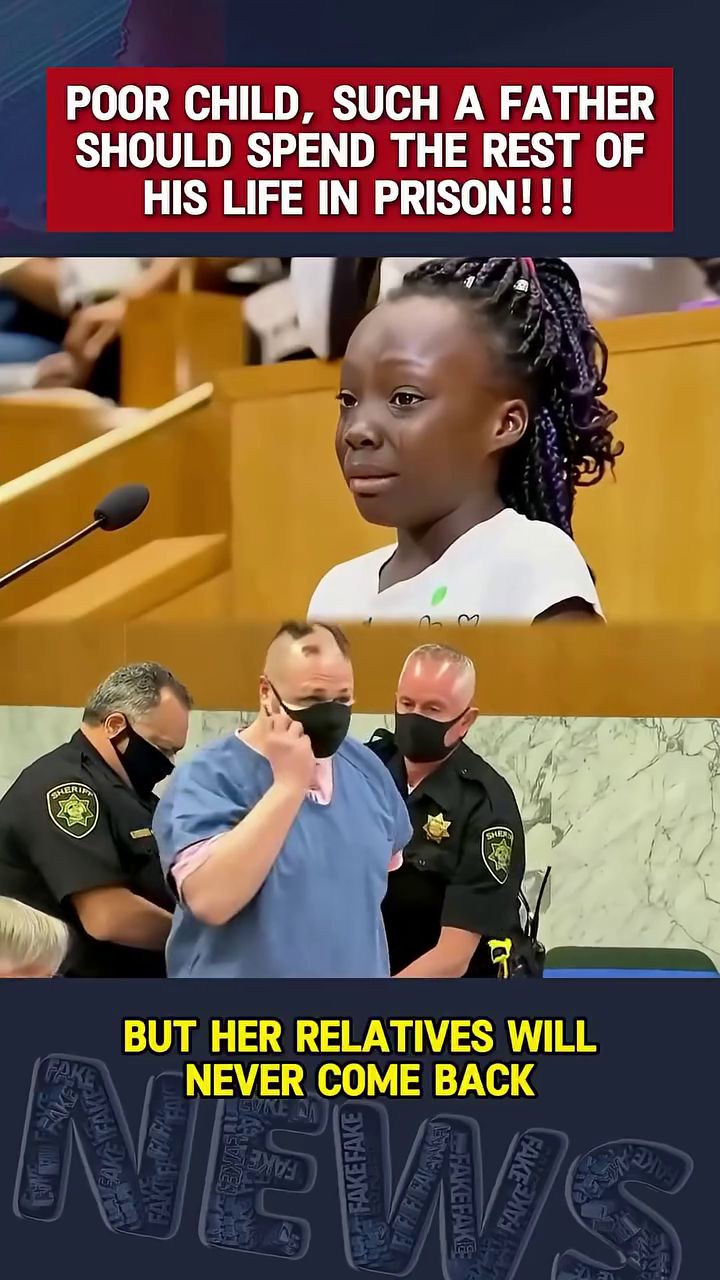The courtroom is often a place of measured procedure and legal formality, but sometimes, a raw, undeniable human emotion erupts that transcends the cold letter of the law. Such was the case during the sentencing of a man known as Patell, whose actions resulted in the tragic end of a nine-year-old boy’s life. The most impactful moment of the entire proceeding was arguably the testimony given by the victim’s younger sister, an eight-year-old girl whose tearful request for justice became a powerful, defining moment of the trial.
This article details the harrowing events that led to the verdict, the devastating testimony delivered by the surviving children, and the judge’s final ruling that sought to deliver a measure of peace to the shattered family and the public that had followed the case with bated breath.
The Defendant and the Deceased
The case revolved around Patell, 36, the stepfather of the victim, James Andrew, who was nine years old at the time of his passing three years ago. Patell was facing charges related to his role in the boy’s demise and the subsequent attempts to conceal the actions. The gravity of the crimes was underscored by the details of the domestic environment, which the prosecution argued was one of prolonged cruelty and deprivation.
From the outside, the home might have appeared ordinary, but beneath the surface lay a reality of severe neglect and repeated brutality. The court heard disturbing evidence suggesting that Patell often subjected James and his two younger siblings, an eight-year-old sister and a seven-year-old brother, to a regime of fear and hunger.
A Childhood of Fear and Hunger
The surviving children’s testimonies painted a chilling picture of their daily lives. The siblings recounted being frequently locked away in the basement, an isolation tactic used by Patell to punish them and prohibit them from accessing the kitchen. The deprivation was so extreme that the children testified to being forced to subsist on food only once every three days. This intentional and systemic starvation was compounded by frequent beatings, which became a terrifying norm in their young lives.
James, in particular, seemed to bear the brunt of Patell’s wrath. The children described how their stepfather constantly subjected James to cruel, physical harm. In a particularly distressing revelation, the court learned that Patell used common children’s toys—such as airplane models and Spider-Man dolls—not for play, but as instruments of violence. He would strike James with these objects until the boy was no longer able to move.
The eight-year-old sister, whose identity is protected for privacy, tearfully described the constant sound of her brother crying—a sound that filled them with a paralyzing mix of helplessness and despair. For the siblings, this relentless emotional and physical torment created an atmosphere of constant anxiety.
The Day of the Tragedy: A Plea Unanswered
The eight-year-old sister provided the most harrowing account of the day James lost his life. She described the deep, constant pangs of hunger that sometimes drove James to desperate measures. She recalled one instance where her brother was caught by Patell attempting to steal food—a small act of survival met with lethal brutality.
She recounted an occasion when she managed to sneak into the kitchen. There, she discovered James lying motionless under a blue blanket. In a frantic, childlike attempt to seek help, she immediately sent a text message to her mother. The mother’s failure to respond was a point of deep focus for the prosecution, as it highlighted the lack of intervention in the brutal home environment.
Later, the girl witnessed the unthinkable. She saw her stepfather, Patell, place James’s body into a black garbage bag and then drag the bag into the backyard. That was the last time she ever saw her older brother. This detail, the use of a simple, everyday object like a trash receptacle to dispose of a human life, underscored the callousness of the act. The boy who was once their protector, their sibling, was gone, his memory forever tainted by the horror of his final moments.
The Courtroom Showdown: A Child’s Powerful Testimony
The emotional climax of the trial came during the victim impact statements. The eight-year-old girl stood before the court, small yet resolute. Her voice, choked with tears, demanded a punishment that matched the severity of the loss. The court was profoundly affected as she looked toward the bench and requested the judge to impose the maximum possible sentence on her stepfather.
Her two younger brothers, a seven-year-old and another eight-year-old (possibly a twin or close in age), also provided statements, echoing the fear, the chronic hunger, and the constant cruelty they endured. They spoke of the toys that had been weaponized against their sibling and how they constantly felt helpless and hopeless in the face of the abuse. Their collective testimony clearly illustrated that Patell’s actions had not only ended one life but had deeply scarred the three surviving children for life.
The Verdict and Sentencing
The overwhelming and consistent evidence presented by the prosecution, combined with the visceral, tearful testimonies of the surviving siblings, left little doubt in the minds of the jury and the presiding judge. The court found Patell guilty of the charges related to his brutal actions against James and the overall cruel treatment of the children.
The judge acknowledged the gravity of the crimes and the profound harm inflicted upon the family. He noted that the actions were carried out over a period of time and involved an extreme breach of trust and duty to care for a vulnerable child.
In response to the children’s pleas for justice and the undeniable evidence of prolonged cruelty and the ultimate demise of James, the judge delivered a severe sentence. Patell was sentenced to life imprisonment without the possibility of parole. This ruling meant that Patell would spend the rest of his natural life behind bars, a decision that the court believed was the only fitting consequence for such terrible and irreversible crimes.
The Lasting Impact
The conclusion of the trial, while bringing legal closure, does little to undo the trauma inflicted on the surviving children. The phrase that accompanied the video footage—”BUT HER RELATIVES WILL NEVER COME BACK”—resonates with the finality of their loss. The children’s lives have been permanently altered, their childhoods marred by abuse, hunger, and the loss of their older brother.
The case serves as a heartbreaking reminder of the silent battles fought within the walls of seemingly normal homes and the critical importance of being vigilant for signs of child abuse. The resilience and courage of the surviving siblings, who faced their abuser in court and demanded justice, offer a flicker of hope amidst the tragedy. Their voices, though small, secured a ruling intended to prevent Patell from ever harming another child and to honor the memory of the young boy who deserved a life of safety and love.
The judge’s decision to impose life without parole reflected a societal demand that crimes of this nature, especially against the most vulnerable, be met with the most serious penalty available, providing a permanent measure of justice for the children who survived.

